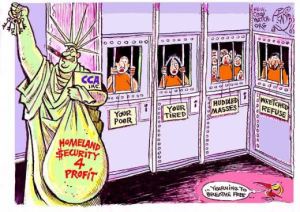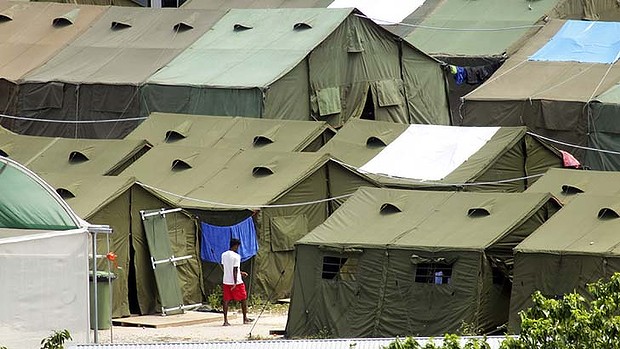 A major area for expansion for private prison operators has been immigration detention centres because of the increase in the number of migrants detained. In the US the number of migrants detained increased 4.5 times between 1994 and 2010 and it is estimated that around half of all migrants detained are in private facilities. American Legislative Exchange Council (ALEC) has had a hand in drafting legislation that allows police officers to demand papers from suspected illegal migrants. Private prison companies have also lobbied strenuously for tougher immigration policy.
A major area for expansion for private prison operators has been immigration detention centres because of the increase in the number of migrants detained. In the US the number of migrants detained increased 4.5 times between 1994 and 2010 and it is estimated that around half of all migrants detained are in private facilities. American Legislative Exchange Council (ALEC) has had a hand in drafting legislation that allows police officers to demand papers from suspected illegal migrants. Private prison companies have also lobbied strenuously for tougher immigration policy.
Two out of thee of Canada's immigrant detention centers are privately operated and The GEO Group owns the Miramachi Youth Detention Facility. In the UK 73% of immigants are detained by private companies.
In its 2008 report Outsourcing Abuse, Medical Justice collated information on close to 300 alleged assaults of [UK] immigration detainees — most occurring while detainees were being moved between centres or deported — over a four-and-a-half year period. Due to under reporting and its own lack of resources to follow up reports, the organisation believes this figure represents "the tip of the iceberg" and claims it is evidence of "widespread and seemingly systemic abuse".
Australia's entire detention system incarcerates almost 9000 people in centres run by private companies. Since 2003 the Department of Immigration has paid $5.6 billion to private companies for detention.  "At $900 a day, a bed at the government's two offshore detention centres at Manus Island and Nauru costs more than a luxury suite with a harbour view at five-star Sydney hotel the Shangri-La (which was $590 a night on Friday)." The cost of the tent kitchen on Manus Island, provided by Toll Holdings, has been over $3.5 million since 2012.
"At $900 a day, a bed at the government's two offshore detention centres at Manus Island and Nauru costs more than a luxury suite with a harbour view at five-star Sydney hotel the Shangri-La (which was $590 a night on Friday)." The cost of the tent kitchen on Manus Island, provided by Toll Holdings, has been over $3.5 million since 2012.
Despite this expenditure, detainees at Manus Island complain about "about lack of water, electricity, air-conditioning, proper medical facilities including any access to emergency treatment". Conditions there have been described by UNHCR's Regional Representative, Richard Towle, as "harsh, hot, humid, damp and cramped".
UNHCR called on Australian and PNG authorities to improve conditions, and ensure an early start to the refugee assessments process in order to prevent increased levels of psycho-social and physical harm amongst asylum-seekers in the detention centre.
G4S ran the immigration detention centres till 2009 when the contract was awarded to Serco by the Labor government. This was despite the Labor Party saying before it was elected to government that the G4S contract should be terminated and "the centres returned to government control so there was a clear line of responsibility back to the minister".
"This is the private company [G4S] that has people coming in the doors with no mental health problems and going out as broken human beings," then Labor immigration spokesman Tony Burke said. "There is one answer and one answer alone, and that is there have been enough breaches of this contract for the government to take action to terminate the privatisation of our detention centres. It was a bad idea from the start. It should not have taken place. It should not be continued."
It was claimed that G4S treated immigrants like prisoners and subjecting them to solitary confinement. G4S was fined "was fined $500,000 in 2005 after staff refused detainees food, water and access to a toilet on a seven-hour bus trip between the Maribyrnong and Baxter detention centres".
In 2008 the Australian Human Rights Commission reported "there is currently no effective mechanism in place to ensure that all immigration detainees are treated in accordance with Australia's human rights obligations". It noted there was no legislated detention standards or independent monitoring of detention and detainees did not have effective ways to appeal breaches of their human rights.
Since December 2009 Serco has been paid over $3 billion to run detention centres in Australia.
In 2013 Transfield took over Nauru detention centre and in 2014 the Manus Island detention centre, after a riot when the centre was under the management of G4S. The riot resulted in the death of an Iranian asylum seeker "and dozens more detainees were injured in violence PNG police allege was perpetrated by locally employed G4S guards". The Transfield contract for both offshore centres will be worth $1.22 billion over 20 months.